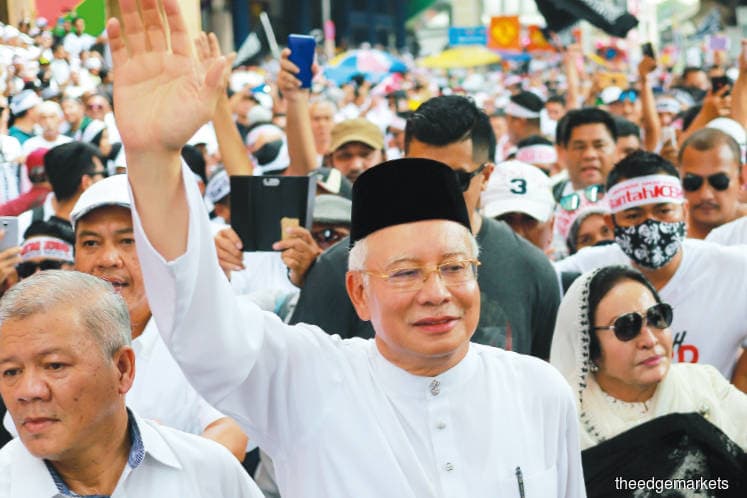
This article first appeared in The Edge Malaysia Weekly on October 21, 2019 - October 27, 2019
WHY make Najib king or emperor, his lead defence counsel Tan Sri Muhammad Shafee Abdullah implied last week at the 1MDB trial of former prime minister Datuk Seri Najib Razak.
Shafee was referring to Article 117 of 1Malaysia Development Bhd’s (1MDB) memorandum and articles of association which invests tremendous powers in the prime minister and 1MDB’s board and management’s interpretation of the provision.
Shafee suggested to former 1MDB chief executive officer Datuk Shahrol Azral Ibrahim Halmi that he had failed to perform his fiduciary duty to act in the best interest of the company by enabling Najib to become the “emperor of 1MDB”.
Shahrol’s interpretation of Article 117 as making Najib the “ultimate power” in 1MDB — especially in big investments, fund raising and national policies — was also flawed, Shafee argued. He said decision-making still lies with the board of directors, and that the provision only acts as a “veto power” allowing the prime minister to block a decision by the board if necessary.
Shahrol countered that this was not the reality in 1MDB.
He pointed to Article 117, first inserted into 1MDB’s precursor Terengganu Investment Authority’s (TIA) memorandum and articles of association (M&A) by Minister of Finance Inc. It stipulates that any amendments to 1MDB’s M&A; any appointment and removal of 1MDB directors or senior management team; and any financial commitments, restructuring or anything to do with the government guarantee — for the interest of the company, country or government policy — must require the prime minister’s written approval.
Notwithstanding the provision, in the strategic development company, Najib also wore three hats — as prime minister, minister of finance and chairman of the board of advisers.
Shahrol had previously testified that the amendment to TIA’s M&A to remove Article 9A and insert Article 117 was under the instruction of fugitive businessman Low Taek Jho, who was acting at the request of Najib.
It replaces a similar clause that gave similar authority to the “federal government” in Article 9A to the “prime minister” in Article 117, which, according to Shahrol, was because Najib wanted to make it unambiguous that the prime minister held 1MDB’s source of power.
Shafee pointed to similar provisions in M&As of other public bodies such as national oil and gas company Petroliam Nasional Bhd, suggesting that his client did not have a “monopoly” in introducing such provisions that give the prime minister wide-ranging powers.
According to Article 109 of Petronas’ M&A, the “chairman of the board shall be appointed by the prime minister and shall at all times hold proxy with respect to all shares held by the government and such proxy shall be exercised [under the direction] of the prime minister.”
“This is such an overwhelming power as the prime minister can virtually overrule the entire board,” Shafee said.
To further prove his point, he went on to state that even ministers are granted similar “far-reaching powers” over companies under their portfolio.
For instance, Shafee cited a provision in Section 10 of the Bank Simpanan Nasional Act 1974, which allows the finance minister to give general directions to the board regarding policies to be pursued by the bank.
Besides that, Section 12 of the Bank Pertanian Malaysia Bhd Act 2008 enables the minister of agriculture and agro-based industry to give directions to the board in respect of agriculture policies to be pursued by the bank, which the board shall comply with.
And under the Tabung Haji Act 1995, the minister in charge may appoint the chairman and CEO of their choice.
Meanwhile, Iskandar Regional Development Authority Act 2007 and Kampong Bharu Development Corporation Act 2011 also allow the premier to appoint the chairman and CEO in charge of the corporations.
As such, Shafee argued such provisions were not uncommon in government-linked companies and that Shahrol had wrongly interpreted Article 117 by implying that Najib had free rein to do as he liked in 1MDB dealings.
Shahrol claimed that much of the investment directions for 1MDB came from Najib through purported “master orchestrator” Low, and that he and the board of directors had felt obliged to follow his wishes.
Notwithstanding Article 117 and the three hats that Najib wore and the different circumstances in which he was supposed to exercise the respective prerogative, Shahrol pointed out that ultimately, regardless of what power Najib was said to be exercising, he would have acted as directed simply because he was the prime minister.
“I can only testify to what had happened. And what happened at that time, to me, we considered these minutes taken and signed by Najib as instructions by the prime minister. As directors, we are duty-bound to execute his wishes.
“So that’s what happened. Whether it was in compliance with the rules, it was fair that you raised [about the law provision], but this is what happened.
“From 2009 until 2013 when I left as CEO, I continued to see the prime minister Najib as the ultimate power in 1MDB.”
Save by subscribing to us for your print and/or digital copy.
P/S: The Edge is also available on Apple's AppStore and Androids' Google Play.